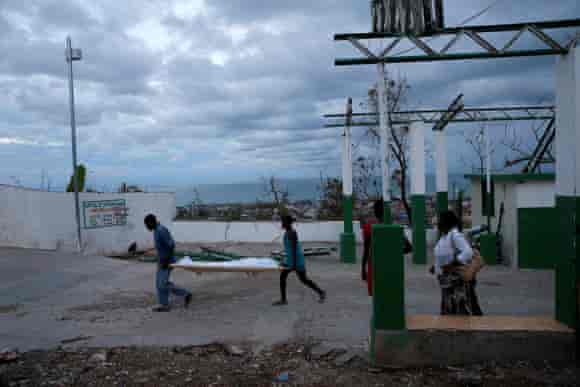Midwife tells of delivering babies by torchlight in flood waters, and fresh threat of cholera as row continues over 2011 outbreak
|
In the aftermath of Hurricane Matthew, there are fears of a huge rise in maternal deaths in Haiti. Karen McVeigh speaks to a midwife at St Antoine hospital in Jérémie, Grand’Anse – one of the country’s worst-hit towns – who tells of delivering babies by torchlight as she stood knee-deep in water, while the hurricane ripped through the south-west tip of the country.
The
widespread devastation has also triggered fears of a fresh cholera
outbreak; this comes at a time when the UN’s human rights special
rapporteur has spoken out against the organisation’s actions over the
epidemic that followed Haiti’s 2010 earthquake. As Ben Quinn reports, in a scathing evaluation at the UN general assembly, Philip Alston condemned as “a disgrace”
the United Nations’ refusal to accept responsibility for the
devastating cluster of cases that claimed more than 9,000 lives, after
the deadly bacterium was brought into the country by peacekeepers
relocated from Nepal.
- the Guardian
Teams from Doctors Without Borders/Médecins Sans Frontières (MSF) are
seeing deteriorating health conditions among people in the heavily
hurricane-affected departments of Sud, Grand’Anse and Nippes.
There are signs of food scarcity: most of the crops are destroyed or
flooded and the vast majority of the livestock is missing or dead. In
Sud and Grand'Anse, MSF has started to monitor the nutritional status of
children under five years old in its mobile clinics in order to provide
treatment with ready-to-use therapeutic food if necessary.
As the cholera epidemic is unpredictable under the current conditions,
it is crucial to monitor new cases, provide sufficient access to
treatment centers and provide safe drinking water. While the number of
patients in MSF's cholera treatment center (CTC) in Port-à-Piment
decreased to six on Oct. 25, the neighboring town of Chardonnières
reported 40 suspected cases.
+++










No comments:
Post a Comment